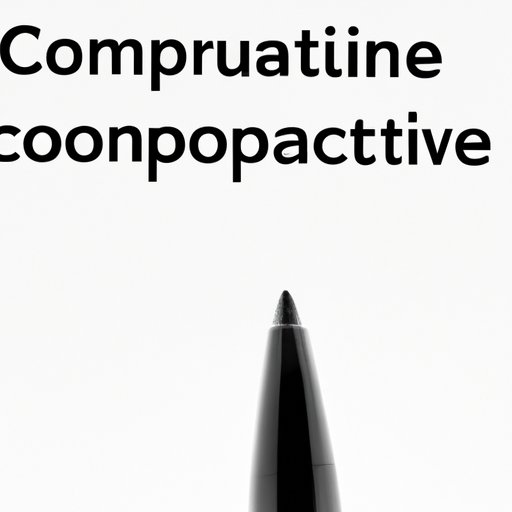Introduction
A composition in writing is an organized collection of ideas that make up the structure of a piece of writing. It is important to understand the basics of writing a composition because it can help you create effective pieces that can be used in various settings, from academic papers to creative works. Whether you are a student or an aspiring writer, understanding the fundamentals of composition is essential for producing quality work.
A Comprehensive Guide to Writing Compositions
Writing a composition can be a daunting task, but with the right guidance and tips, it can be a straightforward process. Here is a comprehensive guide that will help you craft the perfect composition.
Crafting the Perfect Composition: Tips and Strategies
When writing a composition, it is important to have a clear goal in mind. Before beginning, ask yourself what you want to achieve with your writing. Do you want to inform, persuade, or entertain your readers? Knowing the purpose of your writing will help you determine which topics to cover and how to structure your composition.
Once you have identified the purpose of your writing, it is time to brainstorm ideas and conduct research. Brainstorming can help you generate new and interesting ideas and uncover connections between different concepts. Research allows you to find reliable sources to support your arguments and provide evidence for your assertions. Gathering information from multiple sources and synthesizing them into a cohesive argument is a key part of successful composition writing.
The next step is to organize your ideas and create a plan for your composition. Outlining your ideas and creating an outline allows you to see the big picture and structure your writing in a logical way. This will also help you identify potential problems and develop solutions before you start writing.
Understanding the Basics of Writing a Composition
Now that you have a plan for your composition, it is time to start writing. The first thing to consider when writing a composition is grammar and punctuation. Proper grammar and punctuation are essential for producing quality work. Make sure to proofread your work for mistakes and typos before submitting it.
Another important element of writing a composition is style. Developing your own unique style can help you stand out from other writers and make your work more engaging. Consider the tone of your writing and use language that is appropriate for the context. For example, if you are writing an academic paper, use formal language, whereas if you are writing a creative piece, use more informal language.
How to Structure Your Writing for Maximum Impact
The structure of your composition is just as important as the content. A well-structured composition will make your writing more effective and easier to read. Start by introducing your topic and providing the reader with background information. This will give your readers the context they need to understand your arguments. Then, present your main points in the body paragraphs, using evidence to support each point. Finally, conclude your composition with a summary of the key points and any final thoughts or advice.

Essential Elements of Writing a Composition
Now that you understand the basics of writing a composition, let’s take a closer look at the essential elements of successful composition writing.
Thesis Statement
The thesis statement is the main point of your composition and should be presented at the beginning. It should be concise and clearly state the argument you are trying to make. For example, if you are writing an essay about the importance of education, your thesis statement might be “Education is essential for success in life.”
Introduction
The introduction is the first section of your composition and serves to introduce the topic and provide the reader with background information. It should grab the reader’s attention and give them an overview of what your composition is about.
Body Paragraphs
The body paragraphs are where you present your main points and provide evidence to support them. Each paragraph should focus on one point and include evidence from reliable sources.
Conclusion
The conclusion is the last section of your composition and should summarize the main points of your argument. You can also use the conclusion to offer your own opinion or provide advice to the reader.
What is a Composition? Exploring the Different Types
There are many different types of compositions, including narrative, descriptive, expository, and persuasive. Let’s take a closer look at each type.
Narrative
A narrative composition tells a story. It typically follows a chronological order and has a clear plot with a beginning, middle, and end. It can be fiction or nonfiction and often includes characters and dialogue.
Descriptive
A descriptive composition focuses on describing a person, place, or object. It uses sensory details to evoke a vivid image in the reader’s mind.
Expository
An expository composition provides facts and information about a topic. It is typically objective and presents both sides of an argument.
Persuasive
A persuasive composition is used to convince the reader of a particular point of view. It includes evidence and logical arguments to support the writer’s position.
Conclusion
Writing a composition can be a challenging task, but with the right guidance, it can be a straightforward process. Understanding the basics of composition writing is essential for producing quality work. Now that you know the basics of composition writing, you can start crafting your own compositions. Remember to keep your purpose in mind, brainstorm ideas, conduct research, create an outline, and use the essential elements of composition writing.
(Note: Is this article not meeting your expectations? Do you have knowledge or insights to share? Unlock new opportunities and expand your reach by joining our authors team. Click Registration to join us and share your expertise with our readers.)
